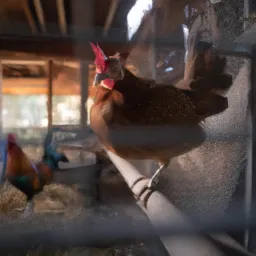Raising Happy Hens: 5 Ways to Keep Your Chickens Smiling from Ear to Ear
Raising Happy Hens: 5 Ways to Keep Your Chickens Smiling from Ear to Ear
Chicken keeping is becoming increasingly popular and for good reason.
Not only do chickens provide fresh eggs, but they also make great pets and are a fun addition to any backyard farm.
However, just like any animal, chickens need proper care and attention to stay happy and healthy.
So, we’ll explore five ways you can keep your chickens smiling from ear to ear.
What Makes a Chicken Happy?
Chickens are simple creatures with basic needs that must be met in order to thrive.
These include food, water, shelter, and space.
But beyond these basics, there are several things you can do to ensure your chickens are happy and content. Here are some of the factors that contribute to a chicken’s happiness:
**Space** – Chickens need plenty of room to move around and stretch their wings. A general rule of thumb is to allow at least four square feet per bird inside the coop, and eight to ten square feet outside.
**Lighting** – Chickens require exposure to natural light in order to maintain their circadian rhythm. This means providing them with access to sunlight during the day and darkness at night.
**Cleanliness** – Clean coops and runs help prevent disease and promote overall wellness. Make sure to clean out your coop regularly and replace bedding as needed.
**Socialization** – Chickens are social animals and enjoy spending time with other birds. Consider adding more hens or even a rooster to your flock if possible.
How Much Space Do Chickens Need to Be Happy?
As mentioned earlier, chickens need plenty of space to be happy and healthy. Inside the coop, each hen should have at least four square feet of space to herself.
Outside, she will need even more room to scratch, peck, and exercise.
As a general guideline, aim for at least eight to ten square feet per bird outside the coop.

If possible, give your chickens access to a larger area such as a pasture or yard where they can forage and explore.
See also Everything You Need to Know About Easter Egger Pullets
Signs of an Unhappy Chicken
Just like humans, chickens may not always show signs of distress or discomfort.
However, here are some common indicators that your chicken might not be feeling her best:
**Lack of appetite** – If your chicken isn’t eating as much as usual, it could be a sign that something is wrong. Check for any underlying health issues or changes in diet.
**Isolation** – If one of your chickens seems to be avoiding the others or hiding away, it could indicate stress or anxiety. Try to identify any potential sources of conflict within the flock.
**Excessive vocalizations** – Some breeds of chickens are naturally noisy, but excessive clucking or squawking could signal boredom or frustration. Provide your chickens with entertainment such as toys or treats to alleviate boredom.
Tips for Keeping Your Chickens Healthy and Happy
Here are some tips for ensuring your chickens remain healthy and happy:
1. **Provide a balanced diet** – Feed your chickens a high-quality feed formulated specifically for laying hens. You can supplement your diet with vegetables and other treats but don’t overdo it on scraps.
2. **Give them plenty of water** – Access to clean drinking water is essential for your chickens’ health. Make sure their water source is clean and replenished daily.
3. **Maintain clean facilities** – Regularly clean out your coop and run to prevent disease and promote overall wellness. Use safe, non-toxic cleaners to avoid harming your chickens.
4. **Monitor for parasites** – Chickens are susceptible to external parasites such as mites and lice. Regularly check your birds for signs of infestation and take appropriate measures to treat them.
Showing Your Chickens Some Love
In addition to meeting their basic needs, there are many ways you can show your chickens some love and affection.
Here are a few ideas:
1. **Handfeed them treats** – Many chickens love being handfed treats such as mealworms or cracked corn. It’s a great way to bond with your birds and provide them with extra nutrition.
See also The Characteristics of Black Star Chickens
2. **Give them toys** – Chickens love exploring and playing with different objects. Provide them with toys such as balls or PVC pipes to chew on.
3. **Groom them** – Gently brush your chickens to remove loose feathers and dirt. This helps keep them clean and comfortable.
The Importance of Socialization for Happy Chickens
Chickens are highly social animals who thrive when given opportunities to interact with each other.
Here are some reasons why socialization is important for happy chickens:
1. **It reduces stress** – Being isolated or separated from the rest of the flock can cause stress and anxiety in chickens. By allowing them to mingle and hang out together, you reduce their levels of stress.
2. **It promotes communication** – Chickens use a variety of vocalizations and body language to communicate with each other. When they’re allowed to socialize freely, they develop stronger communication skills which can lead to better problem-solving abilities.
3. **It improves egg production** – Egg production tends to be higher in flocks where the hens get along well and feel secure in their environment.
Is a Rooster Necessary for a Hen’s Happiness?
While having a rooster in your flock can certainly add to the overall dynamic, it’s not strictly necessary for a hen’s happiness.
In fact, many people choose to keep all-hen flocks due to concerns about aggressiveness and noise level.
That said, some hens do seem to prefer the company of a rooster and may become lonely without one.
Ultimately, whether or not to keep a rooster comes down to personal preference and what works best for your individual flock.
Raising Happy Hens is Easier Than You Think
Raising happy hens doesn’t have to be difficult or complicated.
By following the guidelines laid out above and paying close attention to your chickens’ needs, you can create a peaceful and productive backyard farm that benefits both you and your birds.
Remember, raising happy hens starts with providing them with the right conditions and showing them lots of love and affection.
